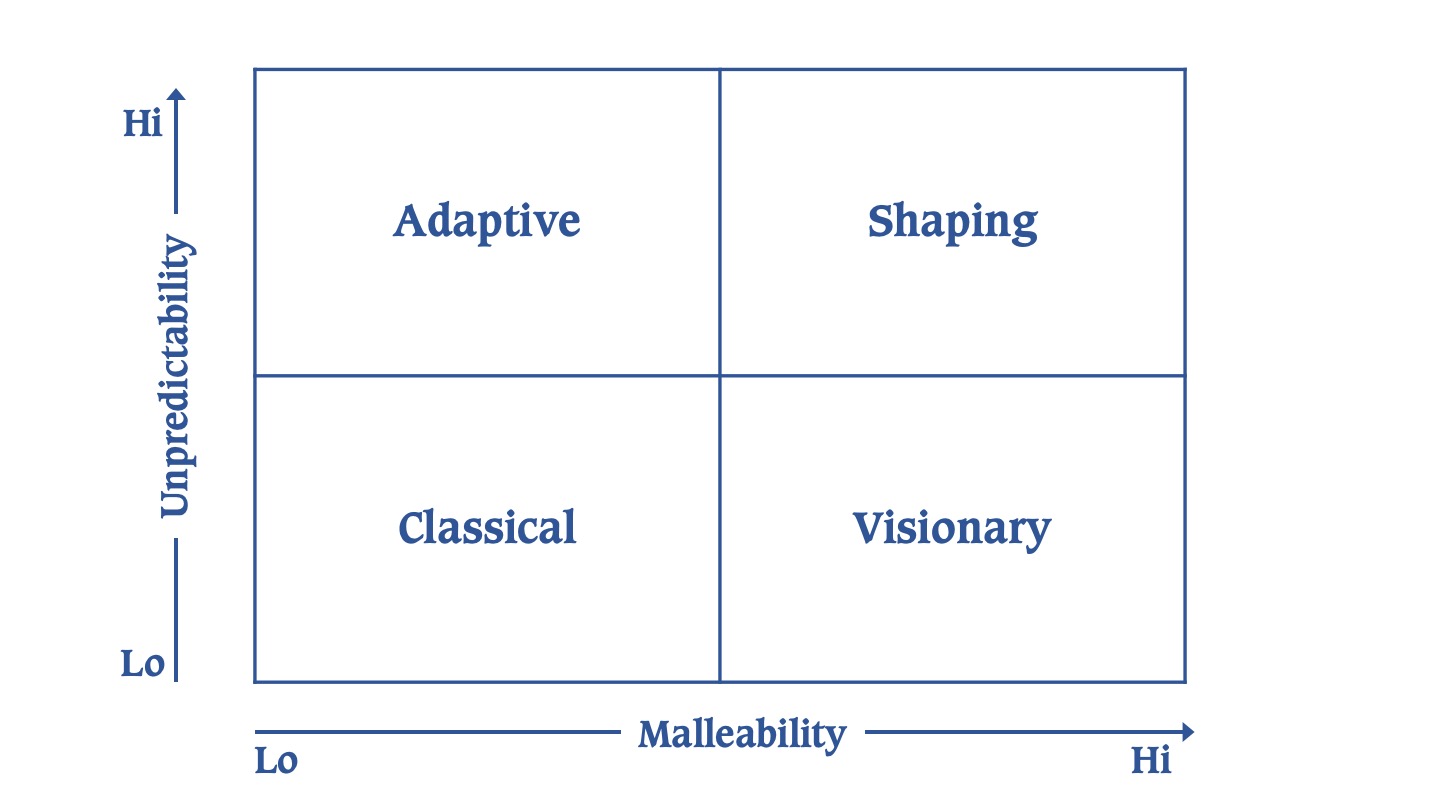In the book, Your Strategy Needs a Strategy, the authors evaluate different approaches to strategy and encourage leaders to employ the approach that matches their context. The five approaches to strategy, according to the authors, are:
- Classical: Build a plan and execute it rigorously. (Companies with robust strategic plans and operational excellence, such as Wal-Mart, Marc Inc., etc.)
- Adaptive: Test options and scale what works. (Start-ups or companies that manage a “portfolio of experiments.”)
- Visionary: Envision a new reality and build it. (Companies that identify an opportunity and are first to market to maximize the opportunity.)
- Shaping: Orchestrate with others an evolving platform. (Companies who reshape an entire industry by orchestrating with others, such as Apple and the App S)
- Renewal: Employ multiple of the above approaches when renewal is needed.
How do you know which strategy you should put into action? It depends on your context and, according to the authors, whether it is predictable and malleable/changeable:

- Classical: Can predict the environment, cannot change the environment
- Adaptive: Cannot predict the environment, cannot change the environment
- Visionary: Can predict the environment, can change the environment
- Shaping: Cannot predict the environment, can change the environment
The framework the authors provide is insightful and helpful. Since I am a church leader I read the book through that lens—asking what applies to me and what does not. What must we remember as church leaders and what can we learn?
What Must We Remember?
As I read the book I kept asking, “What environment is the local church in? Can we predict it? Can we change it?” Theologically, I kept coming back to the reality that there is a lot we can predict, and there is much we must not change.
1. There are promises that will be fulfilled.
Jesus will gather people from every tribe, tongue, and nation. Jesus will build His Church. His Word will not return void. The gospel is the power of God for salvation. In other words, and in the framework of the authors, there are some things we can predict. We are wise to remember we must align our strategy with what God has promised He will do.
2. There are beliefs we must not change.
We have a faith delivered to the saints once and for all (Jude 4). As church leaders, we don’t have the freedom to change our beliefs to match our changing context. If we do, we empty ourselves of the power of His grace and truth.
3. There are practices we must not change.
Unlike a marketplace organization that has the freedom to create a mission, a local church’s mission has been established by our Savior. Not only has our mission been established, but our Savior has instructed us in practices such as gathering together, studying the Scripture, taking communion, etc.
What Can We Learn?
At the same time, it is not wise leadership to be naïve to a changing context, so here are some lessons for church leaders about strategy.
1. Strategy can change while our mission and convictions remain the same.
If we view strategy as how the mission is accomplished, we can change our approach while holding tightly to the beliefs and mission Jesus has given us. The address (the location) of a church must impact the church’s strategy. The context of the local community must impact how the church seeks to serve that community.
2. Long-term strategic plans are less relevant.
I once had a church ask me to help them develop a 50-year strategic plan. I admitted I would be unable to help them because I have never made a plan that long term, and I don’t even believe in a plan that long term. Craig Groeschel has helped me to think that being prepared for opportunities is more important than extensive planning. A well-developed team, a learning culture, and a set of values that keep people focused on the mission are much more important than long-term plans.
3. In times of great cultural change, experimentation is valuable.
Instead of feeling the burden to develop extensive plans, (a practice based on the premise you can predict the future) it is wise to test new approaches and double down on what is bearing fruit.
As church leaders we get to be part of His Church, and the gates of Hades will not be able to overcome His Church.





